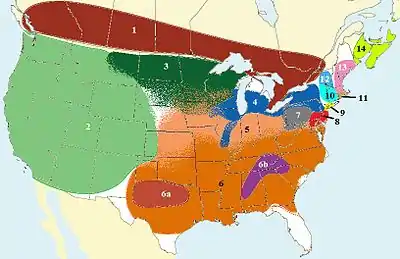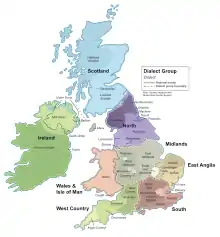List of dialects of English
Dialects are linguistic varieties that may differ in pronunciation, vocabulary, spelling and grammar. For the classification of varieties of English only in terms of pronunciation, see regional accents of English.
Overview
Dialects can be defined as "sub-forms of languages which are, in general, mutually comprehensible."[1] English speakers from different countries and regions use a variety of different accents (systems of pronunciation) as well as various localised words and grammatical constructions; many different dialects can be identified based on these factors. Dialects can be classified at broader or narrower levels: within a broad national or regional dialect, various more localised sub-dialects can be identified, and so on. The combination of differences in pronunciation and use of local words may make some English dialects almost unintelligible to speakers from other regions without any prior exposure.
The major native dialects of English are often divided by linguists into three general categories: the British Isles dialects, those of North America, and those of Australasia.[2] Dialects can be associated not only with place but also with particular social groups. Within a given English-speaking country, there is a form of the language considered to be Standard English: the Standard Englishes of different countries differ and can themselves be considered dialects. Standard English is often associated with the more educated layers of society as well as more formal registers.
British and American English are the reference norms for English as spoken, written, and taught in the rest of the world, excluding countries in which English is spoken natively such as Australia, Canada, Ireland, and New Zealand. In many former British Empire countries in which English is not spoken natively, British English forms are closely followed, alongside numerous American English usages that have become widespread throughout the English-speaking world. Conversely, in many countries historically influenced by the United States in which English is not spoken natively, American English forms are closely followed. Many of these countries, while retaining strong British English or American English influences, have developed their own unique dialects, which include Indian English and Philippine English.
Chief among other native English dialects are Canadian English and Australian English, which rank third and fourth in the number of native speakers. For the most part, Canadian English, while featuring numerous British forms, alongside indigenous Canadianisms, shares vocabulary, phonology and syntax with American English, which leads many to recognise North American English as an organic grouping of dialects.[3] Australian English, likewise, shares many American and British English usages, alongside plentiful features unique to Australia and retains a significantly higher degree of distinctiveness from both larger varieties than does Canadian English. South African English, New Zealand English and Irish English are also distinctive and rank fifth, sixth, and seventh in the number of native speakers.
United Kingdom
England
- Received Pronunciation (sometimes called "the Queen's English" or Standard English in British English)
- Northern
- Cheshire
- Cumbrian (Cumbria including Barrovian in Barrow-in-Furness)
- Geordie (Tyneside)
- Hartlepudlian (Hartlepool)
- Lancastrian (Lancashire)
- Mackem (Sunderland)
- Mancunian (Greater Manchester)
- Northumbrian (Northumberland and northern County Durham)
- Pitmatic (former mining communities of Northumberland and County Durham)
- Scouse (Merseyside)
- Smoggie (Teesside)
- Yorkshire
- East Midlands
- West Midlands
- Black Country
- Brummie (Birmingham)
- Potteries (north Staffordshire)
- Coventry
- East Angle
- Southern
- Cockney (working-class London and surrounding areas)
- Essaxon (Essex)
- Estuary (middle-class London, Home Counties and Hampshire)
- Pompey dialect (Portsmouth)
- Kentish (Kent)
- Multicultural London (London)
- Sussex
- West Country
- Anglo-Cornish
- Bristolian
- Janner (Plymouth)
- Dorset
Scotland
- Scottish English comprising varieties based on the Standard English of England.
Isle of Man
Channel Islands
Gibraltar
Ireland
- Hiberno-English (Irish English)
- Ulster
- Belfast
- Derry
- South Ulster
- Ulster Scots dialects
- West Donegal
- Leinster
- Dublin
- Dublin 4 (D4)
- Inner city
- Suburban Dublin
- Dundalk
- Wexford town
- Dublin
- Connacht
- Galway city
- Mayo
- Sligo town
- Munster
- Cork city
- Waterford
- Kerry
- Tipperary
- Limerick city
- Ulster
Extinct
- Forth and Bargy dialect (also known as Yola), thought to have been a descendant of Middle English, spoken in County Wexford[4][5]
- Fingallian, another presumed descendant of Middle English, spoken in Fingal[4]
The Netherlands
Germany
Sweden
Norway
Finland
Mainland Denmark
Greenland
North America

1. Standard Canadian English
2. Western American English
3. North-Central American ("Upper Midwest") English
4. Inland Northern American ("Great Lakes") English
5. Midland American English
6. Southern American English
6a. Texan English
6b. Inland Southern American ("Appalachian") English
7. Western Pennsylvania ("Pittsburgh") English
8. Mid-Atlantic American ("Baltimore" and "Philadelphia") English
9. New York City English
10. Southwestern New England English
11. Southeastern New England ("Rhode Island") English
12. Northwestern New England ("Vermont") English
13. Northeastern New England ("Boston" and "Maine") English
14. Atlantic Canadian English
United States
- Cultural and ethnic American English
- African American English ("Ebonics")
- Boontling
- Cajun Vernacular English
- Hawai‘i English
- Latino (Hispanic) Vernacular Englishes
- Chicano English (Mexican-American English)
- Miami English
- New York Latino English
- Pennsylvania Dutch English
- Yeshiva English
- American Everyday English
- General American: the "standard" or "mainstream" spectrum of American English.
- American English
- Regional and local American English
- Appalachian English
- New England English
- Eastern New England
- Boston and Maine: Greater Boston, including most of eastern Massachusetts
- Rhode Island
- Eastern New England
- Tangier
- Southeast super-region
- Mid-Atlantic (Delaware Valley)
- Midland
- North Midland: Iowa City, Omaha, Lincoln, Columbia, Springfield, Muncie, Columbus, etc.
- South Midland: Oklahoma City, Tulsa, Topeka, Wichita, Kansas City, St. Louis (in transition), Decatur, Indianapolis, Cincinnati, Dayton, etc.
- "Hoi Toider"
- New Orleans
- Southern
- Southern Appalachian: Linden, Birmingham, Chattanooga, Knoxville, Asheville, and Greenville
- Texas Southern: Lubbock, Odessa, and Dallas
- Upper Dixie: Smyrna, Nashville, Murfreesboro, and Munster Ireland
- New York City
- Northern
- Inland Northern: Chicago, Cleveland, Detroit, Milwaukee, Western New York, the Lower Peninsula of Michigan, and most of the U.S. Great Lakes region
- Western New England: Connecticut, Hudson Valley, western Massachusetts, and Vermont
- North Central (Upper Midwestern): Brockway, Minot, Bismarck, Bemidji, Chisholm, Duluth, Marquette, etc.
- Western
- Western Pennsylvania (Pittsburgh)
- Extinct or near-extinct American English
Caribbean, Central, and South America
Caribbean
The Bahamas
Barbados
Belize
Bermuda
Cayman Islands
Falkland Islands
Guyana
Honduras
Jamaica
Saint Vincent and the Grenadines
- Vincentian English
Trinidad and Tobago
Asia
Bangladesh
- Bangladeshi English (Benglish or Banglish)
Brunei
Burma
Hong Kong
- Hong Kong English
- China
- Chinese Pidgin English (Extinct)
India
Indian English:
- Standard Indian English
- Indian English: the "standard" English used by administration and educated people, it derives from the British Raj.
- Regional and local Indian English
- East Region
- West Region
- Gujarati English
- Maharashtrian English
- North Region
- South Region
Japan
Malaysia
Middle East
Nepal
Pakistan
Philippines
- Philippine English (PhE) (similar to American English with some influence of British English)
Singapore
- Singapore English, (similar to British English)
Sri Lanka
- Sri Lankan English (SLE)
Africa
Cameroon
The Gambia
Ghana
Kenya
Liberia
Malawi
Namibia
Nigeria
- Nigerian English (similar to American English and British English)
South Africa
- South African English (similar to Australian English, British English and Zimbabwean English)
- Black South African English
- Acrolect
- Mesolect
- Cape Flats English
- Indian South African English
- White South African English
- Broad accent
- General accent
- Cultivated accent
- Black South African English
South Atlantic
- South Atlantic English spoken on Tristan da Cunha and Saint Helena[7]
South Sudan
- South Sudanese English
Uganda
Zimbabwe
- Zimbabwean English (Shares similarities with British English and other Southern Hemisphere Englishes especially South African English)
Oceania
Australia
Australian English (AusE, AusEng):
- Cultural
- General Australian
- Broad Australian
- Cultivated Australian
- Australian Aboriginal English
- Regional
- South Australian English
- Western Australian English
- Torres Strait English
- Australian Chinese Vernacular English
- Victorian English
- Queensland English
- Tasmanian English. Rough terrain and long history of habitation promotes a diverse phonological situation. The Trap-Bath split has a consistent yet different distribution than mainland Australia.
Fiji
Fiji English (FijEng, en-FJ)
World Global English
These dialects are used in everyday conversation almost all over the world, and are used as lingua francas and to determine grammar rules and guidelines.
See also
References
- Wakelin, Martyn Francis (2008). Discovering English Dialects. Oxford: Shire Publications. p. 4. ISBN 978-0-7478-0176-4.
- Crystal, David. The Cambridge Encyclopedia of the English Language, Cambridge University Press, 2003
- Trudgill and Hannah, 2002
- Hickey, Raymond (2005). Dublin English: Evolution and Change. John Benjamins Publishing. pp. 196–198. ISBN 90-272-4895-8.
- Hickey, Raymond (2002). A Source Book for Irish English (PDF). Amsterdam: John Benjamins Publishing. pp. 28–29. ISBN 90-272-3753-0.
ISBN 1-58811-209-8 (US)
- "Chicago Daily Tribune". 1903-06-02. Archived from the original on 2017-03-12. Retrieved 2020-01-22.CS1 maint: bot: original URL status unknown (link)
- Daniel Schreier, Peter Trudgill. The Lesser-Known Varieties of English: An Introduction. Cambridge University Press, Mar 4, 2010 pg. 10
- Harrington, Jonathan; Gubian, Michele; Stevens, Mary; Schiel, Florian (13 November 2019). "Phonetic change in an Antarctic winter". Journal of the Acoustical Society of America. 146 (5): 3327–3332. doi:10.1121/1.5130709. PMID 31795649. Retrieved 12 October 2020.
- Bard, Susanne. "Linguists Hear an Accent Begin". Scientific American. Retrieved 2020-04-28.
Further reading
- Hickey, Raymond (ed.) (2004). Legacies of Colonial English. Studies in Transported Dialects. Cambridge: Cambridge University Press. ISBN 978-0521175074.CS1 maint: extra text: authors list (link)
- Hickey, Raymond (ed.) (2010). Varieties of English in Writing. The Written Word as Linguistic Evidence. Amsterdam: John Benjamins. ISBN 9789027249012.CS1 maint: extra text: authors list (link)
- Hickey, Raymond (2014). A Dictionary of Varieties of English. Malden, MA: Wiley- Blackwell. ISBN 978-0-470-65641-9.
- "English Language§Varieties of English", Encyclopædia Britannica, Vol. 6 Earth–Everglades (Fifth ed.), 1974, pp. 883–886
- Bolton, K. (2002), Hong Kong English: Autonomy and Creativity, Asian Englishes Today, Hong Kong University Press, ISBN 978-962-209-553-3, retrieved 2015-10-22
- Crystal, David (2003). The Cambridge Encyclopedia of the English Language (Second ed.). Cambridge, UK: Cambridge University Press. p. 109. ISBN 0-521-53033-4. Retrieved 2006-07-20.
- Fischer, Steven Roger (2004), History of Language, Reaktion Books, ISBN 978-1-86189-594-3
- Okrent, A. (2010), In the Land of Invented Languages: A Celebration of Linguistic Creativity, Madness, and Genius, Spiegel & Grau Trade Paperbacks, ISBN 978-0-8129-8089-9
- Nunan, David (2012), What Is This Thing Called Language?, Palgrave Macmillan, ISBN 978-1-137-28499-0
External links
- Sounds Familiar? Listen to examples of regional accents and dialects from across the UK on the British Library's 'Sounds Familiar?' website
- A national map of the regional dialects of American English
- IDEA – International Dialects of English Archive
- English Dialects – English Dialects around the world
- Dialect poetry from the English regions
- American Languages: Our Nation's Many Voices - An online audio resource presenting interviews with speakers of German-American and American English dialects from across the United States
- electronic World Atlas of Varieties of English (eWAVE)
